17 February 2016
The peak angular speed of the human eye can reach 900 degrees/second during quick, simultaneous movements of both eyes called saccades , which serves as a mechanism for visual fixation.
High-frame-rate video recorded at 700fps highlights the strong inertial forces experienced by the eye during movement. Both the iris and the liquid aqueous humor filling the anterior chamber of the eye can be seen rippling as the eye comes to a sudden stop. While there are diseases and surgical procedures than can exacerbate the amount of motion, this is considered perfectly normal functionality.
Source: http://redd.it/4638mi
#ScienceGIF #Science #GIF #Eye #SlowMotion #HighFrameRate #Inertia #Iris #AqueousHumor
View Original Post on Google+

12 February 2016
The Laser Interferometer Gravitational-Wave Observatory (LIGO) is a large-scale physics experiment designed to detect gravitational waves predicted by Einstein’s Theory of General Relativity. There are two facilities located in Livingston, LA and Hanford, WA.
As the name implies, LIGO uses a technique called laser interferometry to detect the miniscule effects of a gravitational wave. A laser beam is split into two beams and the phase of one beam inverted relative to the source. The two laser beams are relayed down 4km tubes where they are reflected off a mirror. Because the two laser beams are anti-phase (phases are 180° apart), they cancel each other out via destructive interference and no signal is detected.
However, if a gravitational wave is passing by, it will stretch and compress the total travel length of the two laser beams. This means the two lasers are no longer anti-phase and will produce a detectable signal via their constructive interference.
For the gravitational wave detected on September 14, 2015, by LIGO, the distortion to the path length was approximately 1/1000th the diameter of a proton. This makes LIGO one of the most sensitive devices ever built by humanity.
Source: http://www.einsteinsmessengers.org/index.htm
#ScienceGIF #Science #GIF #LIGO #GravitationalWave #Laser #Interferometer #Physics #Detector #Phase #Light #Astronomy #Discovery
View Original Post on Google+

11 February 2016
This simulation of the GW150914 event detected by the Laser Interferometer Gravitational-Wave Observatory (LIGO) at 09:51 UTC on September 14, 2015, represents the merger of a binary black hole system into a single black hole. The event is estimated to have occurred 1.3 billion years ago when two black holes (36x and 29x solar mass) merged into a single 62x solar mass with ~3x solar mass worth of energy emitted as gravitational waves.
The existence of gravitational waves was first predicted 100 years ago by Albert Einstein through his famous Theory of General Relativity. Despite being produced by all accelerating masses, the detection of these waves has eluded humanity due to their miniscule effect. The two US-based LIGO observatories use a technique called laser interferometry to detect these fluctuations in spacetime, which are as small as 10^-18 m, or about 1/1000th the diameter of a proton.
Source: https://youtu.be/YsZFRkzLGew
LIGO Announcement: https://goo.gl/GzHlM0
#ScienceGIF #Science #GIF #Astrophysics #Simulation #LIGO #GravitationalWave #Gravitational #Einstein #Relativity #GeneralRelativity #BlackHole #Binary #Orbit #Merge
View Original Post on Google+
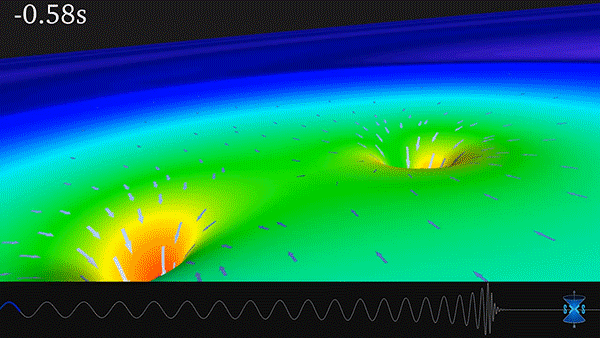
10 February 2016
The burning of different elements results in different flame colors. This occurs because the process of burning something excites the outer shell electrons of an atom to a higher energy shell. When the electrons fall back to their original position, they release energy in the form of heat and light. Because each element has a different number and arrangement of electrons, they emit different frequencies of light.
Source: https://youtu.be/NY-bnY0yjWw
#ScienceGIF #Science #GIF #Flame #Burning #Element #Molecule #Atom #Electrons #Heating #Color
View Original Post on Google+
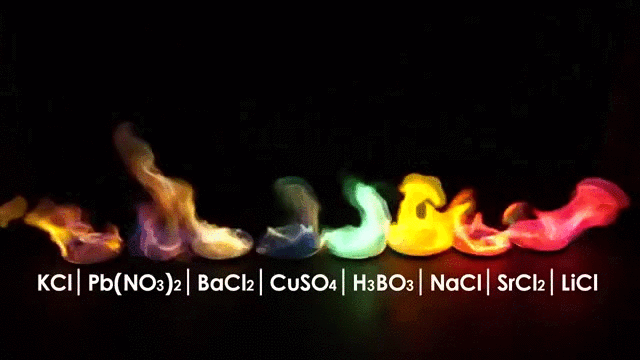
9 February 2016
Polymerization is the process by which small molecules called monomers link together to form long chains called polymers. The polymer chains can be indefinitely long and are limited only by the availability of reactants.
Nylon is formed by combining sebacoyl chloride (in carbon tetrachloride) with hexamethyldiamine (in water). At the interface between the non-mixing solutions, the molecules combine to form the polymer nylon. Slowly pulling the material out of the container allows for new polymer to be continuously formed as the reaction proceeds.
Source: https://youtu.be/bNh5hK2f6TM
#ScienceGIF #Science #GIF #Polymerization #Nylon #Monomers #Molecules #Reaction #Chemistry
View Original Post on Google+
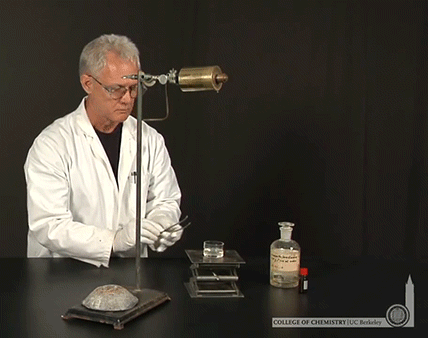
4 February 2016
This timelapse depicts a glowing rockfall on the slopes of the volcano Mount Sinabung in North Sumatra, Indonesia. Glowing rocks break off from the volcano’s lava dome and cascade down the flanks of the mountain.
Source: https://youtu.be/I_MCzS9WYao
#ScienceGIF #Science #GIF #Volcano #Magma #Lava #Rockfall #Eruption #Fire #Smoke #Earth
View Original Post on Google+

3 February 2016
Macropinna microstoma , more commonly known as “barreleyes” or “spook fish,” is a small deep-sea fish famous for its tubular eyes and transparent head. First discovered in 1939, marine biologists have been fascinated by the unique eye design that allows for highly efficient light collection in the pitch-black environment of the deep sea.
The eyes, which are capped in green and point almost straight upwards, were long thought to only provide limited upwards tunnel-vision for the fish. Recent research has shown that the eyes can actually rotate within the transparent head to look forward when necessary.
Source: http://www.mbari.org/barreleye-fish-with-tubular-eyes-and-transparent-head/
#ScienceGIF #Science #GIF #Biology #Barreleyes #SpookFish #Fish #Marine #MarineBiology #Water #Ocean #Eyes #DeepSea #Weird
View Original Post on Google+
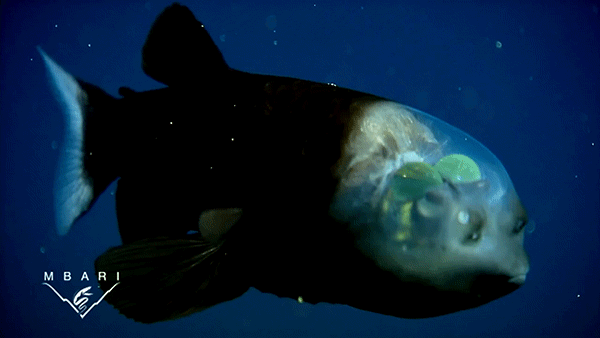
2 February 2016
The Potential Field Source Surface (PFSS) model is used to visualize the dynamic magnetic field of our Sun. It uses a combination of observed measurements of magnetic field strength and direction on the solar surface to understand how solar material moves. The twisting magnetic fields form the enormous coronal loops frequently observed on the surface of the Sun.
Source: http://svs.gsfc.nasa.gov/cgi-bin/details.cgi?aid=12104 (NASA Goddard)
#ScienceGIF #Science #GIF #Sun #Solar #Magnetic #Field #MagneticField #FieldLines #Visualization #NASA #Goddard #Outerspace #Physics #Astronomy
View Original Post on Google+
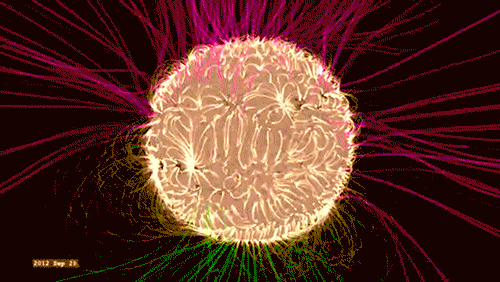
1 February 2016
A waterspout is an intense columnar vortex that occurs over a body of water. They most commonly appear as funnel-shaped clouds connected to a cumuliform or cumulonimbus cloud. Only the strongest versions that spawn from mesocyclones (like land-based tornados) actually suck up water. Waterspouts are most commonly seen in tropical and sub-tropical climates. The Florida Keys average 400+ observations annually.
Source: https://youtu.be/HACO32JGQz0
#ScienceGIF #Science #GIF #Weather #Waterspout #Ocean #Meteorology #Funnel #Cloud #Australia
View Original Post on Google+

29 January 2016
The density is water is approximately 800x greater than the density of air. Drag force (air/fluid resistance) scales with the square of the velocity and with the density of the fluid. This means that a bullet fired underwater experiences 800x more drag force than a bullet fired in air and will only travel a very short distance before losing all its momentum. The bullet can be seen tumbling shortly after exiting the gun, which further increases the resistance to its movement. The pressure waves generated by the firing can be seen rapidly expanding outwards before collapsing backwards along the path of the bullet.
A Mythbusters episode found that for most guns, being only 3 feet underwater would protect you from a gun fired at a 30-degree angle (including a .50-caliber gun with armor-piercing rounds). They confirmed the myth that you can dive underwater to protect yourself from gunfire.
Source: https://youtu.be/OubvTOHWTms (Slow Mo Guys)
#ScienceGIF #Science #GIF #Physics #Density #Water #Air #Gun #Pressure #Wave #Compression #Turbulence #Oscillations #Resistance
View Original Post on Google+











